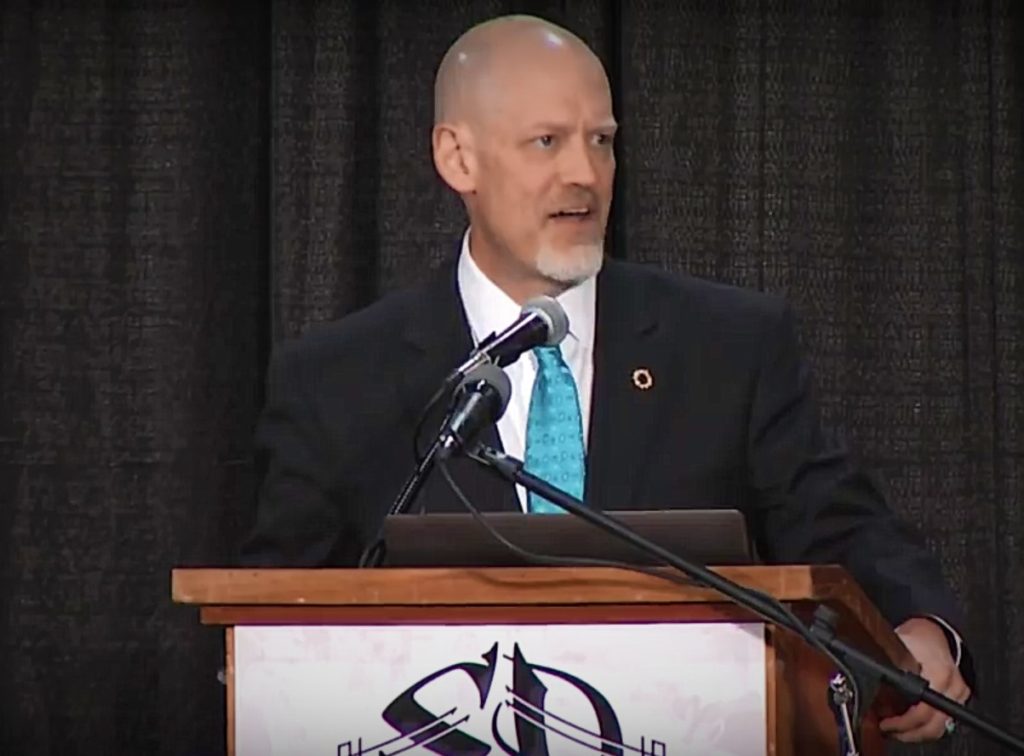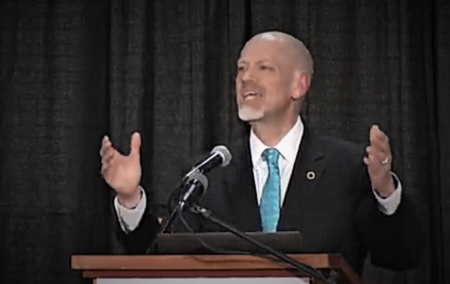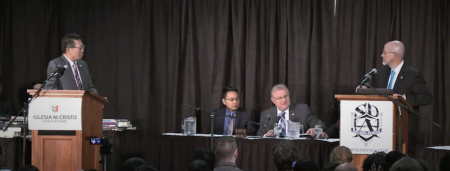Podcast: Play in new window | Download
Subscribe: Spotify | Email | RSS
 Some would say that Reformed apologist Dr. James White, director of Alpha and Omega Ministries, is the best contemporary debater on behalf of traditional catholic views on the Trinity. Certainly, he’s had time and opportunity to sharpen his arguments, having debated the Trinity and/or the “deity of Christ” with (among others) a Muslim scholar, some biblical unitarians (also here), a Oneness Pentecostal, and a defender of Jehovah’s Witness Theology.
Some would say that Reformed apologist Dr. James White, director of Alpha and Omega Ministries, is the best contemporary debater on behalf of traditional catholic views on the Trinity. Certainly, he’s had time and opportunity to sharpen his arguments, having debated the Trinity and/or the “deity of Christ” with (among others) a Muslim scholar, some biblical unitarians (also here), a Oneness Pentecostal, and a defender of Jehovah’s Witness Theology.
But how strong is his case? In Dr. White’s view, “the” Trinity doctrine is easily deduced from the Bible. Is that true?
In this and the next episode of the trinities podcast, I evaluate Dr. White’s opening statement from a recent debate with a minister from the non-trinitarian Iglesia ni Christo denomination from the Philippines. I find that in many ways, Dr. White does not connect with the views of his opponent. And he hunkers down in some simple traditional language about the Trinity, never clarifying just what he thinks the Trinity is. For example, he does nothing to undermine arguments that “the” Trinity doctrine is incoherent.
Argument 1: collapsing the Father and Son
1. The Father just is God (i.e. the Father and God are numerically one).
2. The Son just is God (i.e. the Son and God are numerically one).
3. God just is the Son. (From 2, by the symmetry of numerical identity: if a = b then b = a.)
4. The Father just is the Son. (From 1 and 3, by the transitivity of numerical identity: if a = b and b = c, then a = c.)
5. It is not the case that the Father just is the Son.
Dr. White commits to 1, 2, and 5. But then, 3 and 4 follow. And 4 contradicts 5. If “the” Trinity implies 1, 2, and 5, then it is incoherent! What does Dr. White do to show us how a trinitarian can avoid 4? Nothing! And to make matters worse, it’s not clear that 1 and 2 are consistent with any Trinity theory, which demands that the one God be numerically the same as the Trinity.
Argument 2: from Trinity to polytheism
1. The Father is divine.
2. The Son is divine.
3. The Spirit is divine.
4. None of these just is any other: Father, Son, Spirit (i.e. they are distinct; no pair are numerically one).
5. To be divine is to be a god.
6. For any x and y, x and y are the same god only if x just is y (i.e. if they are numerically one, the same being/entity). (In other words, being the same god requires being the same being.)
7. There are at least three gods. (1-6)
Dr. White affirms 1-4, and seems committed to 5 also (we’re talking about “full” deity here). 6 seems self-evident. But 7 follows. If each of the three is a god (1-3, 5), and they’re not the same god, because they’re numerically distinct (4,6), then there exist at least three gods (7).
It doesn’t help to just insist that the Trinity is by definition monotheistic. If it also commits to 1-5, then it seems incoherent, affirming both monotheism and polytheism. And Dr. White doesn’t show us how a trinitarian can avoid 7.
Other problems relate to his reliance on controversial translations and/or interpretations of several texts, and on the dubious relevance of texts where Jesus is (arguably) referred to as “God.”
Next week, we’ll hear the rest of his case. Maybe it gets better?
Links for this episode:
- Dr. James White vs Bro. Joe Ventilacion – Who Is God? – Trinity Debate – Official
- Dr. James White
- “Trinity” analytic theology surveys – by Dale Tuggy, by Daniel Howard-Snyder, by Harriet Baber
- Buzzard on Augustine on John 17:3
- Logic and John 17:1-3
- “the only true President” of the USA – another laughable Fox News blunder
- podcast 62 – Dr. Dustin Smith on the preexistence of Jesus in the gospel of John
- podcast 61 – Dr. Dustin Smith on preexistence in ancient Jewish thought
- Titus 2:13; 2 Peter 1:1-2; Romans 9:5; John 20:17; John 20:28: Matthew 1:22-3; Isaiah 7:10-16; John 8:28; John 20:31; John 10; John 8:58; John 18:5-6; Philippians 2
- Kermit Zarley on “My Lord and my God.”
- podcast 70 – The one God and his Son according to John
- “Trinity Schminity” by Winterband
- Jesus’s argument in John 10
- Who Should Christians Worship? (paper)
- podcast 48 – 2 interpretations of Philippians 2 – part 1
- podcast 49 – 2 interpretations of Philippians 2 – part 2

- On the fulfillment fallacy:
- podcast 124 – a challenge to “Jesus is God” apologists
- This week’s thinking music is “Anxiety,” by Kai Engel.


I think it is fairly clear that White would reject 5., as would most one-self Trinitarians and some three-self Trinitarians (e. g. Trinity monotheists), I think. On their understanding, to be divine is to share a divine essence, or (as Leftow says) one deity-trope. Thus, while (for example) the Son is “divine”, he is not “a god”, therefore he is neither the same god nor a different god than the Father, who isn’t a god either. While White has criticized W. L. Craig’s Cerberus analogy, I think his understanding of the Trinity is fairly close to Craig’s.
Thanks for the comment, Balint. Yeah, I can’t tell that he would deny 5. Some, putting their faith in relative identity theory, will say that each is a god, and that the three of them are “the same god.” Dr. White prefers to say, “The Father is God.” That implies being a god, does it not? It’s hard to tell! He’ll talk about the three “sharing the being” of God, but this could mean many things. May I ask you where Dr. White said something that made you think his views are like Craig’s, where the Father (etc.) are somehow minds or states of consciousness within one soul which is God?
Hi Dale,
Thanks for the reply. You wrote: “May I ask you where Dr. White said something that made you think his views are like Craig’s, where the Father (etc.) are somehow minds or states of consciousness within one soul which is God?”
I’ve heard him say things like God/the Trinity is “one what and three who’s”; or that the divine essence “is not a person, but is personal”. This seems to me quite clearly to be a kind of composition-based Social Trinitarian view, and in that sense akin to Craig&Moreland’s, especially in view of the claim that the divine essence is personal. You should consult his book The Forgotten Trinity (available for Kindle), chapters 2 and 12. I suspect he’s the kind of Social Trinitarian who, when strongly pushed, falls back on mysterianism.
Hi Balint – thanks. Yeah, I read it long ago and concluded that there as not really a clear position there. But I picked it up off my shelf just now, and I see that he said more than I remembered around 169ff. Maybe I’ll do a post on that, trying to interpret him.
Still, in a debate your job is to clearly state what your view is, and I’m afraid he did not do that in this debate.
If he wants to adopt a positive mysterian stance, then I hope he does that. It’s not an easy sell, that one’s seemingly contradictory Bible interpretation should be mandatory for all!
“Next week, we’ll hear the rest of his case. Maybe it gets better?”
is this going to be a response on you tube? if yes, can i have the link please
Hey James – here is part 1, same as this post https://www.youtube.com/watch?v=JoT4Ph3F9PM Part 2 will be out tomorrow, here and on YouTube.
One interesting support of the NT Trinitarian conception is in the Old Testament. I am continually disappointed that scholars on both sides of the debate do not interact with the concept of Jewish Binatarianism. It can be demonstrated that there are two entities seen often in the OT that can and do receive worship. Also, while the idea of Logos being a divine identifier in John is frequently thought to be of a Hellenistic source, in fact it is also frequently seen in OT. When the “Word of the Lord” comes to various prophets, it is apparent that sometimes this abstraction has material existence, such as when the “Word” (Logos???) touched Jeremiah in Jeremiah 1. See also the calling of Samuel, among others.
So, thinking contextually as a 1st Century Jew for a moment, if the intellectual/theological background for that person understands that there exists a mysterious second divine person with divine prerogative, with material existence (at times), it is easy to see how that person could understand Jesus eventually as divine and preexistent. Aside from the analytical arguments against the Trinity, using what seems to me variants of symbolic logic, the scriptural arguments as you pointed out can go either way depending on the nuance of the Greek. Considering the likely mindset of the 1st century Jew, I believe their understanding tips them–and us–toward Trinitarian conception. The semantics impress me more than the analytics simply because I see the semantics as presenting what God wants us to understand. Analytics try to understand the divine from within the limitations of our spacetime. That perspective must be merely a subset of a greater reality and hence complexity. I deal with psychiatric patients as a physician, and my mind is constantly being stretched by fantastical experiences that seem to transcend our banal reality. Likewise, it is possible, if not in fact quite likely, that the analytics of the Lord’s Realm are a little more dimensionally complex than our limited perspective allows.
Perhaps someday the Lord will grant you admission to a class on analytic theology…from Heaven’s perspective! Shalom!
Hi Stephen,
Thanks for the comment.
“It can be demonstrated that there are two entities seen often in the OT that can and do receive worship.”
Not in my view. I deny that the OT gives the reader any grounds at all for positing multiple divine persons. The closest I’ve seen is the work of Philo, which is utterly confused – his talk of various “Powers” which (for Platonic reasons) he interposes between God and the cosmos. He can’t decide if they are just that (God’s powers or some sort of emanations from him) or whether they are intermediate, lesser divine beings. I’m aware of the work of Boyarin, if that’s what you’re talking about. I’ve seen some pretty harsh reviews of that from experts in the field. I’ve also seen Heiser’s speculations on this, and some sort of fringe guys that he appeals to. As best I can tell, this is eager, speculative stuff, and not good, sober scholarship. I will, though, deal more with it here at some future date(s).
White(and any other honest trinitarian) cannot avoid 7. They just equivocate and/or repeat “No, I’m a monotheist” as if it somehow answers the claim.
Arguably most people who claim “The trinity is polytheism” are doing it out of ignorance, but there are those of us who’ve taken the time to figure it out and recognize where trinitarians commit their non-sequiturs and equivocation to avoid it and know it is polytheism at heart.
Dale,
Great job on this podcast. I’m glad you offered some alternative explanations of the passages in addition to a sound a critique of White’s argumentation.
Dale,
Great idea to do with series. I hope you’ll also share some insights on how you would interpret some of the key passages that White presented in defense of his ideas about preexistence and incarnation.
Excellent analysis. Reblogged on Blogging Theology
https://bloggingtheology.net/2017/05/01/podcast-181-whites-case-for-the-trinity-part-1/
Comments are closed.